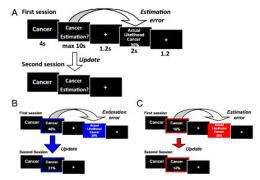September 25, 2012 report
Researchers use magnetic pulses to brain to reduce overly optimistic tendencies

(Medical Xpress)—Scientists have known for many years that human beings, as a general rule, are an overly optimistic bunch. We close our eyes to statistics suggesting our eating habits may be killing us, ignore warnings about texting while driving and almost always believe things will come out all right in the end if we'll just hang in there, despite sometimes obvious indications to the contrary. Research has suggested that two specific symmetrically opposite parts of the brain influence our optimism or pessimism, but until now haven't been able to offer direct proof. Now however, new research by a group of neuroscientists has found, as they describe in their paper published in the Proceedings of the National Academy of Sciences, that turning off one of these areas via magnetic pulses dramatically reduces overly optimistic tendencies.
The human brain has two areas in the brain known as the left and right inferior frontal gyrus (IFG) which are believed to at least partly control our feelings of optimism and pessimism. More specifically, the left IFG has been suspected of being the side involved in processing "good" information, while the right does the same with "bad." Interestingly, the right IFG doesn't seem to be as good at its job as the left, which has led to some theories regarding while we're all so darned optimistic about things.
To gain more evidence regarding the true role of both IFGs, the research team used transcranial magnetic stimulation (TMS), which is a way to focus magnetic energy onto specific parts of the brain to cause them to go to sleep for a little while. Thirty volunteers were enlisted, some of which had the TMS trained on their left IFG, others on the right, and still others on a placebo area of the brain. Afterwards, each volunteer was asked to rate the likelihood of several bad things on a list happening to them. After answering, each volunteer was then read the real likelihood of each of those things happening to them based on actual evidence. The volunteers were then once again asked to rate the likelihood of the same things happing to them to see if hearing the real odds had made any impact. The only change noted was for those that had had the TIMS directed onto their left IFG; they became noticeably more logical and less likely to paint a rosier picture of the evidence just presented to them.
While the study offers clear evidence that the left IFG is most certainly involved in our generally overly optimistic outlook, it doesn't explain how it does so, or why, though the researchers suggest it might be a trait we've evolved to make us more likely to overlook some dangers so that we'll seek out and explore new environments, increasing the likelihood of our survival overall by populating more areas.
More information: Selectively altering belief formation in the human brain, PNAS, Published online before print September 24, 2012, doi: 10.1073/pnas.1205828109
Abstract
Humans form beliefs asymmetrically; we tend to discount bad news but embrace good news. This reduced impact of unfavorable information on belief updating may have important societal implications, including the generation of financial market bubbles, ill preparedness in the face of natural disasters, and overly aggressive medical decisions. Here, we selectively improved people's tendency to incorporate bad news into their beliefs by disrupting the function of the left (but not right) inferior frontal gyrus using transcranial magnetic stimulation, thereby eliminating the engrained "good news/bad news effect." Our results provide an instance of how selective disruption of regional human brain function paradoxically enhances the ability to incorporate unfavorable information into beliefs of vulnerability.
© 2012 Medical Xpress












